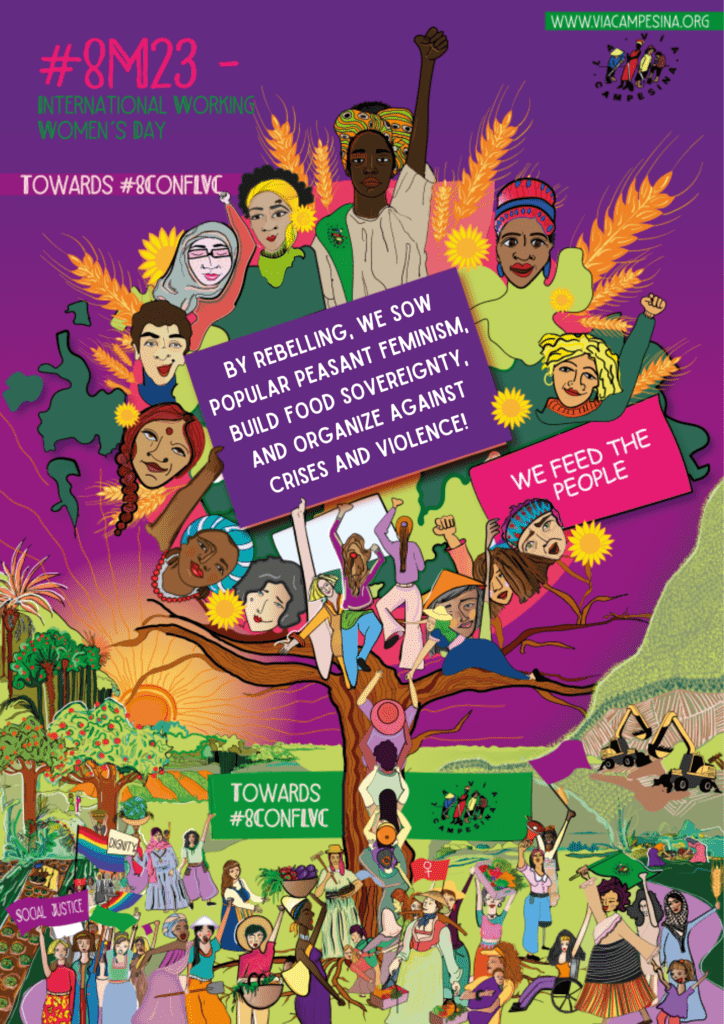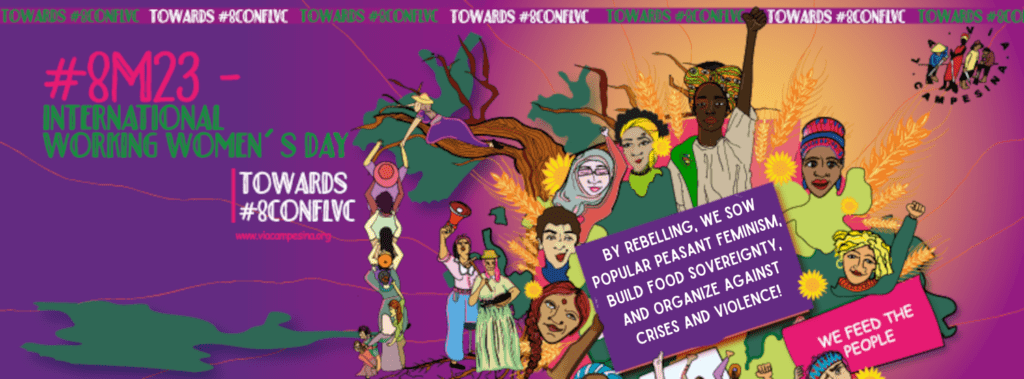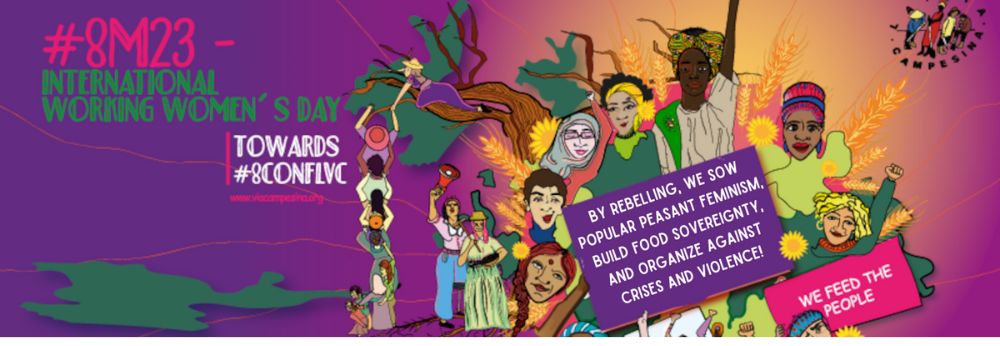La Via Campesina Call to Action | 23 February 2023 | Bagnolet:
#8M23: “By rebelling, we sow popular peasant feminism, build food sovereignty, and organize against crises and violence!”
La Via Campesina is calling for global solidarity actions on 8th March 2023, the International Working Women’s Day. As peasants, landless women, indigenous women, fisherfolk, pastoralists, farmworkers, migrants, and diversity organizations within La Via Campesina, we acknowledge the specific struggles, the organization, the development of popular feminism, and the rebellion and resistance of women who fight on their own land and around the world to defend sustainability, food sovereignty, and social justice.

We condemn the patriarchal and racist dimensions of capitalism that oppress society, particularly women, children, and individuals who do not conform to binary gender identities. In the current crisis of war and inequality, it is urgent to reaffirm our values of solidarity and internationalism, demand greater democracy and participation for communities, and continue to fight against all types of violence. Collective organization is essential to resist, to continue producing healthy food, and to reinforce Food Sovereignty as a way of life in our communities.
As we prepare for La Via Campesina’s 8th International Conference and 6th International Women’s Assembly, scheduled to take place from November 23 to 28 in Nicaragua, we are actively working on the creation of the Peasant and Popular Feminism movement. Additionally, we are using our ‘Stop Violence Against Women’ campaign as both internal and external educational tools, engaging with communities, playing a transformative role in policymaking, and recognizing our fundamental role in food production.
Our Peasant and Popular Feminism movement is anti-systemic, and we are engaged in a struggle against the hetero-patriarchal, racist, and colonialist system that imposes various forms of oppression on people and communities. Over the 30 years of our movement’s existence, we have come to understand that it is only possible to dismantle this capitalist model if we simultaneously succeed in overcoming these oppressive relationships.
The current expansion of capitalism in rural areas is sustained through a combination of oppression in agribusiness and extractivism, manifested in dispossession, evictions, and land grabbing. There has been a surge in criminalization and violence in rural communities. On this day of action and unity, we face the challenge of taking a stronger stance on global issues in the face of the prevailing model and the urgent need for a new society with new relationships, alternative ways of sharing work, and the creation of new values based on independence and reciprocity. As women members of La Via Campesina, we struggle for the land, because through Land Reform, peasant women are guaranteed the legal right to land. On this land, we produce food to feed our families and societies, secure our income, reduce violence, and combat machismo.
Moreover, on this day, we are urging Member States to demonstrate a serious and sustained commitment to the United Nations Declaration on the Rights of Peasants, particularly with regard to Article 4, which addresses non-discrimination against women. This article states that ‘Member States shall take appropriate measures to eliminate all forms of discrimination against peasant women and other women working in rural areas, and to promote their empowerment, enabling them to enjoy full and equal access to all human rights and fundamental freedoms, and to participate in economic, social, political and cultural development in the rural sector, and to benefit from it in full freedom.’
In light of the alarming rates of feminicide worldwide, which expose the inadequacy of justice systems that perpetuate impunity and inaction, we must act urgently. It is imperative that we implement public policies aimed at eliminating all forms of gender-based violence and promote a more equitable society for everyone. Member states should prioritize investment in prevention, education, and communication programs that foster healthier and more compassionate communities and relationships.
Today, we must remember and stand in solidarity with our peasant and indigenous women in Peru, who have been protesting in the streets for over two months against state and criminal repression in defense of their fundamental rights, including democracy.
We also salute the feminists and women’s organizations in Turkey who established a feminist solidarity group for disaster relief. The group was built not only to show solidarity with women and LGBTI+ people in the affected areas but also to raise awareness about the government’s negligence and violations of rights in disaster management.
We must also celebrate the bravery of plantation workers in Sri Lanka who are striking for better wages and working conditions, and we must support the millions of peasant women in Asia and Africa who are fighting to protect their land, seeds, and forests.
We must stand with Angelina, Oliva, and Rosa in Guatemala, three Q’eqchi’ Maya leaders who were unjustly sentenced in a political trial for defending their land against the plundering and land-grabbing of businesses and state officials. This verdict exposes the structural racism of the Guatemalan justice system, which criminalizes those who defend their land and territory.
We stand in solidarity with Palestinian women and the Palestinian people in their struggle for dignity and the right to live on the land illegally occupied by Israel for over 50 years. Let us draw inspiration from the courageous resistance in Haiti and the fight against imperialism. These rebellions are fueling the growth of popular peasant feminism, inspiring working-class women around the world to stand up and fight for their rights.
In the last three years following the pandemic, the perpetuation of feminicide has undergone changes in terms of its conditions and characteristics. The violence against women has become more dangerous and misogynistic, resulting in the loss of thousands of lives and leaving children orphaned without any support from the state. This is precisely why the significance of #8M23 is more pronounced than ever before, as it provides a platform for women to voice their concerns and be seen as agents of political change. Through this movement, women can denounce the violence being perpetrated against them and expose instances of feminicide that are not limited to families alone but are also related to economic crime, territorial disputes among narco-traffickers, and the high prevalence of criminality.
By rebelling, we sow popular peasant feminism, build food sovereignty, and organize against crises and violence!
To find out more about Peasant and Popular Feminism, see our publication here.
Join the movement! #8M23
- We are actively preparing for #8M23 by creating banners, organizing public protests, and taking direct action.
- Join and follow us on social media using hashtags such as #WomenInStruggle, #FoodSovereigntyNOW, #8ConfLVC, and #8M23.
- Participate in symbolic actions such as marches, forums, fairs, and public speaking events to demand recognition of our rights in government policies and justice, and to put an end to violence against women and marginalized communities.
Please send your press releases, statements, photos, and videos to communications@viacampesina.org
We also invite you to make your own posters by downloading our templates and translating them into your own language. All the necessary resources for communication are available for download here.

This post is also available in Español.

